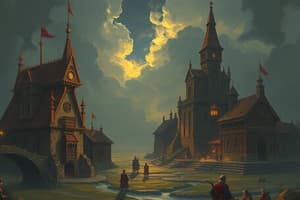Podcast
Questions and Answers
What was a key characteristic of the Renaissance?
What was a key characteristic of the Renaissance?
- Revival of classical learning and humanism (correct)
- Emphasis on collective societal achievement
- Focus on religious fundamentalism
- Revival of medieval learning
Which development is associated with the Scientific Advancements during the Renaissance?
Which development is associated with the Scientific Advancements during the Renaissance?
- Improvement in perspective in art (correct)
- Development of the telephone
- Invention of the steam engine
- Discovery of the laws of motion
What motivated European exploration during the Age of Exploration?
What motivated European exploration during the Age of Exploration?
- Aim to conquer indigenous populations only
- Desire for new trade routes and access to resources (correct)
- Quest for scientific knowledge alone
- Desire for isolation from global trade
Who was the first explorer to successfully reach India by sea?
Who was the first explorer to successfully reach India by sea?
What was a significant consequence of the Age of Exploration?
What was a significant consequence of the Age of Exploration?
Flashcards are hidden until you start studying
Study Notes
Renaissance
- Time Period: 14th to 17th centuries, beginning in Italy and spreading across Europe.
- Key Characteristics:
- Revival of classical learning and humanism.
- Emphasis on individualism and secularism.
- Flourishing arts and literature; notable figures include Leonardo da Vinci, Michelangelo, and Shakespeare.
- Important Concepts:
- Humanism: Focus on human potential and achievements, inspired by classical texts.
- Patronage: Wealthy families (e.g., Medici) supported artists and scholars.
- Scientific Advancements: Notable developments in anatomy, astronomy (Copernicus), and innovation in perspective in art.
- Significant Events:
- Printing Revolution: Johannes Gutenberg's printing press (c. 1440) facilitated the spread of ideas.
- Protestant Reformation: Challenged Catholic Church’s authority, intertwining with Renaissance humanism.
Age of Exploration
- Time Period: 15th to 17th centuries, marked by European maritime exploration.
- Key Motivations:
- Economic: Desire for new trade routes and access to spices, gold, and other resources.
- Political: Nationalism and competition among European powers.
- Religious: Spread of Christianity and conversion of indigenous peoples.
- Notable Explorers and Discoveries:
- Christopher Columbus: Discovered the Americas in 1492.
- Vasco da Gama: First to reach India by sea (1498).
- Ferdinand Magellan: Led first expedition to circumnavigate the globe (1519-1522).
- Consequences:
- Columbian Exchange: Exchange of goods, ideas, and populations between the Old and New Worlds.
- Colonization: Establishment of European colonies, leading to the exploitation of indigenous populations.
- Global Trade Networks: Emergence of a global economy and trade in commodities like sugar, tobacco, and slaves.
Renaissance
- Time Period: Spanned from the 14th to the 17th centuries, originating in Italy and expanding throughout Europe.
- Key Characteristics:
- Marked by a revival of interest in classical learning, particularly from ancient Greece and Rome.
- Emphasized humanism, celebrating human potential and achievements beyond religious contexts.
- Arts and literature flourished, featuring influential figures such as Leonardo da Vinci, Michelangelo, and Shakespeare.
- Important Concepts:
- Humanism: Centered around individual achievement and critical thinking, influenced by ancient texts.
- Patronage: Wealthy families, like the Medici, played a crucial role in supporting artists and intellectual endeavors.
- Scientific Advancements: Contributed to breakthroughs in anatomy and astronomy; Copernicus introduced heliocentric theories, transforming perspectives on the universe and fostering art techniques like linear perspective.
- Significant Events:
- Printing Revolution: Invention of the printing press by Johannes Gutenberg around 1440, which revolutionized information dissemination and literacy.
- Protestant Reformation: A significant religious movement that questioned the Catholic Church's authority, merging with Renaissance humanistic ideals.
Age of Exploration
- Time Period: Lasted from the 15th to the 17th centuries, characterized by extensive maritime exploration by European nations.
- Key Motivations:
- Economic: Exploration driven by the quest for new trade routes and valuable resources, including spices and gold.
- Political: European nations sought to expand their power and prestige through colonization and territorial claims.
- Religious: Efforts to spread Christianity and convert indigenous populations were a significant part of the exploration agenda.
- Notable Explorers and Discoveries:
- Christopher Columbus: Encountered the Americas in 1492, unaware of the continents' prior existence.
- Vasco da Gama: Achieved the first successful sea route to India in 1498, establishing trade connections.
- Ferdinand Magellan: Undertook the first expedition to circumnavigate the globe from 1519 to 1522, illustrating the vastness of the Earth.
- Consequences:
- Columbian Exchange: Initiated a widespread exchange of goods, ideas, and populations between Europe and the New World.
- Colonization: European powers established colonies, resulting in the exploitation and devastating effects on indigenous populations.
- Global Trade Networks: The emergence of a global economy, facilitating trade in commodities such as sugar, tobacco, and human cargo through slavery.
Studying That Suits You
Use AI to generate personalized quizzes and flashcards to suit your learning preferences.




